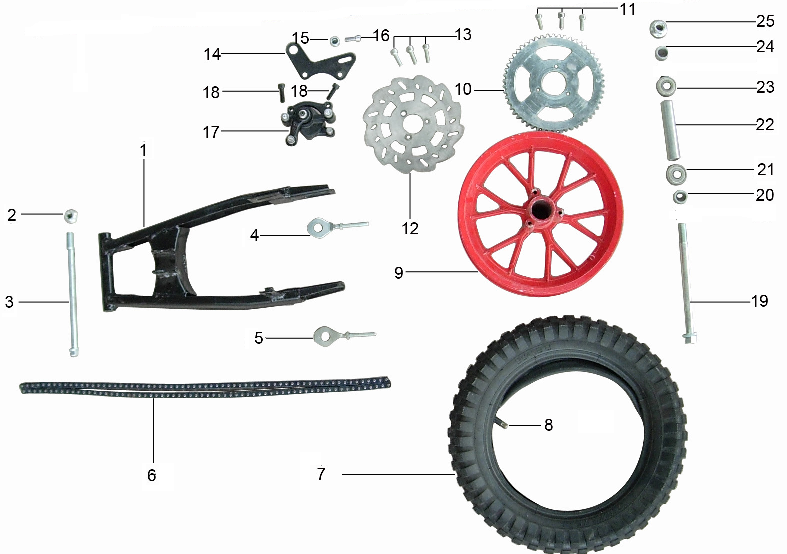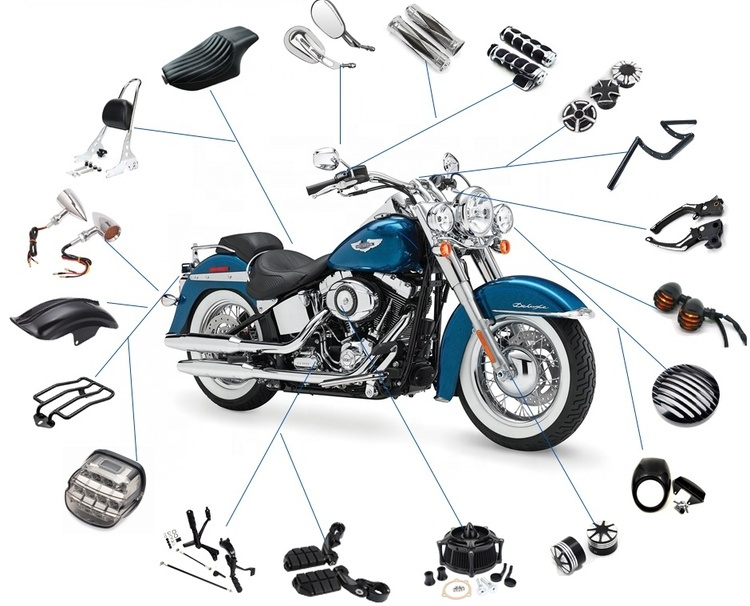Discover the Important MotorBike Parts You Need for Optimum Performance
Comprehending the important components of a bike is essential for attaining peak performance. Each element, from the engine to the stopping system, plays a crucial function in total functionality and safety. Normal maintenance can avoid unanticipated failings and enhance the riding experience. Lots of cyclists overlook the intricacies of these systems. Discovering how they interact can cause an extra reliable adventure. What crucial components should every biker prioritize?
The Engine: The Heart of Your Motorbike
The engine serves as the core element of a motorbike, driving its performance and defining its capabilities. It is accountable for converting fuel into mechanical energy, which powers the bike forward. Numerous kinds of engines are employed, consisting of single-cylinder, V-twin, and inline arrangements, each offering distinctive features matched for various riding designs and functions. The engine dimension, normally determined in cubic centimeters (cc), significantly influences performance, with bigger engines normally offering even more power and torque.Furthermore, the engine's design and technology, such as gas injection systems or air-cooling versus liquid-cooling, impact effectiveness and reliability. Upkeep is important for peak procedure; factors like routine oil adjustments and checking spark plugs warranty durability. Riders typically think about an engine's responsiveness and level of smoothness, as these qualities improve the overall riding experience. Inevitably, the engine remains a crucial component that defines not just the motorcycle's efficiency but additionally the motorcyclist's connection to the maker.
The Transmission: Shifting Gears Efficiently
The transmission plays an important duty in a motorbike's efficiency, particularly in the technicians of gear moving. Understanding exactly how to shift equipments efficiently can improve the total riding experience, while regular upkeep guarantees peak performance. Correct interest to these facets can greatly influence the durability and efficiency of the motorcycle.

Gear Shifting Mechanics
Smooth gear changing is important for ideal motorbike efficiency, greatly influencing both acceleration and control. The auto mechanics of equipment changing involve the interaction in between the clutch, equipment lever, and transmission system. When a biker involves the clutch, it disengages the engine from the transmission, permitting a gear adjustment without harming the components. A well-timed release of the clutch, integrated with specific movement of the gear lever, promotes a smooth change between equipments. This procedure assures that the engine operates within its best power band, improving efficiency. Motorcycle Parts Auckland. Furthermore, comprehending the equipment proportions and their result on rate and torque can help riders make notified options throughout changes, inevitably adding to a more enjoyable and receptive riding experience
Upkeep Tips Relevance
Regular upkeep plays a crucial role in guaranteeing that the transmission system operates efficiently, enabling smooth gear changes. Regularly inspecting and altering the transmission fluid is vital, as old liquid can bring about raised rubbing and wear. In addition, checking the clutch for wear assurances peak interaction and disengagement, avoiding slippage during gear adjustments. Lubrication of relocating parts is equally important to reduce rubbing and improve performance. Motorcycle proprietors must likewise monitor for leakages and unusual noises, as these can show underlying problems. By adhering to these upkeep ideas, bikers can prolong the life-span of their transmission system, ensuring that gear shifts continue to be smooth and contributing to the total efficiency of their motorbike.
The Braking System: Ensuring Safety on Every Trip
Braking systems are basic components that directly influence a motorbike's safety and security and performance. They are composed of different components, including brake pads, blades, calipers, and hydraulic lines, all interacting to ensure effective slowdown. The sort of braking system-- generally either disc or drum-- influences responsiveness and stopping power.Regular upkeep is important to promote peak performance; used brake pads can lead to reduced performance and boosted quiting distances. Furthermore, the quality of brake liquid should be checked, as it can absorb wetness with time, compromising stopping efficiency.Riders need to also take into consideration the importance of anti-lock braking systems (ABDOMINAL MUSCLE), which prevent wheel lockup during sudden quits, enhancing general security. Effectively functioning brakes are not practically quiting; they instill confidence in the motorcyclist, permitting for safer navigation with various surfaces. Ultimately, a dependable stopping system is critical for enjoying every trip with peace of mind.
The Suspension: Enhancing Convenience and Control
A well-functioning shock absorber substantially adds to a motorcycle's general performance, complementing the effectiveness of the stopping system. The suspension plays a substantial duty in taking in shocks from unequal surfaces, guaranteeing a smoother adventure while keeping tire contact with the road. This get in touch with is crucial for both stability and control, allowing motorcyclists to browse corners with confidence and precision.Different kinds of suspension systems, such as telescopic forks or mono-shocks, provide differing degrees of comfort and handling. Properly tuned suspension boosts responsiveness, supplying the biker with a more linked feel to the motorcycle. Routine upkeep checks are vital to identify the suspension elements, consisting of dampers and springs, are operating at their best. A reliable shock absorber not only raises the riding experience but also adds to the durability of various other motorbike components by reducing wear and tear. As an outcome, purchasing top quality suspension is important for any kind of major motorcycle lover.
The Tires: Attaching You to the Road
Tires play an essential function in a motorcycle's performance, functioning as the primary link in between the motorcyclist and the road. Comprehending the various sorts of tires offered can greatly affect handling and security. In addition, regular maintenance is crucial to assure peak tire performance and durability.
Tire Keys In Explained
How do different tire types affect a motorcycle's performance? Tire types play a crucial duty in determining a motorbike's grasp, security, and handling. Sport tires, developed for high performance, deal enhanced traction and responsiveness on paved roadways, making them excellent for racing and aggressive riding. On the other hand, visiting tires focus on durability and comfort, offering a smoother experience for long-distance traveling. Off-road tires, identified by their sturdy step patterns, master grip on unpaved surface areas, you can check here ideal for journey fanatics. In addition, dual-sport tires mix features from both off-road and on-road groups, providing to functional riding demands. Inevitably, picking the appropriate tire kind is necessary for maximizing efficiency, making sure security, and improving the general riding experience.
Upkeep Tips Offered
While riding when driving, maintaining perfect tire condition is vital for safety and security and efficiency. On a regular basis inspecting tire pressure is important, as under-inflated tires can lead to inadequate handling and boosted wear. It is a good idea to examine tread deepness frequently; used tires concession hold and stability. Furthermore, motorcyclists ought to look for indicators of damage, such as bulges or fractures, which can indicate the demand for replacement. Turning tires regularly guarantees also use, enhancing longevity. Moreover, maintaining tires clean from particles and preventing too much visuals can prolong their life-span. Lastly, maintaining appropriate alignment and equilibrium contributes to peak efficiency, reducing stress and anxiety on other bike parts. Sticking to these upkeep suggestions will substantially enhance the overall riding experience.
The Gas System: Sustaining Performance and Efficiency
The fuel system plays an important function in taking full advantage of a motorcycle's performance and efficiency, as it ensures the optimum distribution of fuel to the engine. It comprises a number of essential elements, consisting of the fuel tank, gas pump, gas filter, and fuel injectors or carburetor. Each component should operate effectively to assure a powerful and smooth ride.The gas container shops gas and provides it to the engine by means of the gas pump, which produces the needed stress. A gas filter prevents contaminants from going into the engine, while the injectors or carburetor mix fuel with air for combustion.Proper maintenance of the fuel system is important; a clogged up filter or malfunctioning injector can bring about decreased efficiency and raised gas intake. By validating that the gas system runs successfully, cyclists can appreciate better throttle feedback, far better gas economic climate, and generally improved riding experience.
The Electrical System: Powering Your Ride
An efficient electric system is crucial for the total capability and security of a motorbike, as it powers vital elements such as the ignition, illumination, and different electronic systems. This system includes the battery, which shops energy, and the alternator, responsible for creating power while the engine runs. The circuitry harness links these components, ensuring reliable power distribution.Additionally, integrates secure the system from overloads, while relays assist control have a peek at this website high-current tools with low-power signals. A well-kept electrical system boosts performance by ensuring smooth begins and consistent procedure of lights and signals, important for rider presence and safety.Regular checks of the battery's charge and links are very important for avoiding electric failures. Cyclists must also check wiring for damage, guaranteeing all parts function preferably. Ultimately, a durable electrical system adds considerably to the general efficiency and dependability of the motorcycle.
Frequently Asked Concerns
Just how Often Should I Replace My Motorbike's Battery?
The regularity of motorcycle battery replacement relies on usage and upkeep (Oem Parts New Zealand). Typically, batteries must be replaced every three to five years. Routine checks can help recognize when a substitute is essential for peak efficiency
What Tools Do I Need for Standard Motorcycle Maintenance?
For fundamental bike maintenance, one calls for necessary devices such as a socket set, wrenches, screwdrivers, pliers, tire pressure gauge, and a torque wrench. These devices promote effective upkeep and ensure the bike runs successfully and safely.
How Can I Enhance My Motorbike's The rules of aerodynamics?
To boost bike aerodynamics, one should consider changing fairings, utilizing windscreen extensions, enhancing body placement, and lowering total weight. These modifications help minimize drag, enhancing stability and fuel effectiveness during trips.
What Are the Indicators of a Failing Electric System?
Indicators of a falling short electric system consist of lowering lights, problem beginning, irregular instrument analyses, and blown integrates. Oem Parts New Zealand. Uncommon smells or rust look these up around battery terminals may also show underlying concerns requiring instant attention for safety and efficiency

How Do I Pick the Right Oil for My Bike?
When choosing oil for a motorbike, one ought to consider the producer's specifications, thickness rankings, and the kind of riding. Furthermore, synthetic versus standard oil can impact efficiency and engine security, influencing the choice greatly. The engine size, generally measured in cubic centimeters (cc), substantially influences performance, with bigger engines typically providing even more power and torque.Furthermore, the engine's design and modern technology, such as gas injection systems or air-cooling versus liquid-cooling, influence effectiveness and reliability. A well-functioning suspension system considerably adds to a motorcycle's overall efficiency, complementing the performance of the braking system. The gas system plays an essential duty in making best use of a motorcycle's performance and effectiveness, as it ensures the optimal shipment of fuel to the engine. A gas filter prevents pollutants from getting in the engine, while the injectors or carburetor mix fuel with air for combustion.Proper maintenance of the fuel system is essential; a clogged filter or malfunctioning injector can lead to reduced performance and increased fuel usage. A well-kept electrical system improves performance by making certain smooth beginnings and consistent procedure of lights and signals, important for rider exposure and safety.Regular checks of the battery's cost and links are vital for avoiding electric failings.
Comments on “Is It Worth Investing In OEM-Spec OEM Parts New Zealand?”